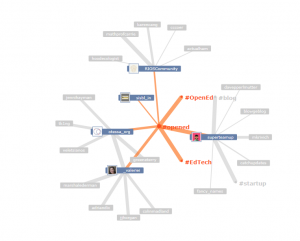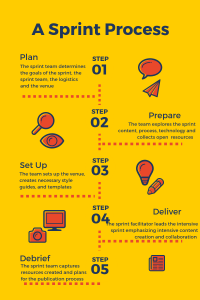Open Communities
Engage: Ways to Collaborate & Share

Get Information
As you learned in the Ontario Extend Collaborator Module, a common space for open educators to gather is Twitter. However there are many other ways to engage and learn about work being done openly. Explore some of the ways below!
Build a Team
Maybe you have already decided that you would like to engage in open work — and you are wondering where you can go to find partners. As explored in the “Open Course Design and Assessment” module, you can work with students on open projects to meet teaching and learning outcomes. You can also find other faculty who may be interested in working on a project with you.
Team Building Resources
- The Rebus Guide to Publishing Open Textbooks (So Far) provides a whole section on building a team and project scoping to assist you in your open project. See below for the underlying principles and key tactics shared in the book for team building.
Building a Team — Underlying Principles
Teams come in all shapes and sizes. Whether you’re a team of four or 40, it’s important to have people who are invested in the project and who believe in its mission and goals.
It’s not just about sharing the workload. Having a diverse and representative mix of people on your project allows different perspectives and experiences to shape the book, so it’s not just a product of one person and actually reflects the experiences of readers.
Communication is the key to a well-functioning team. Set up clear expectations about what needs doing, and be sure to communicate clearly and frequently with your team to avoid delays and surprises.
Every team needs project champions or cheerleaders. Reminding your team about successes along the way, and having someone cheering them on at each step does wonders for team morale. Not only will this lift spirits, but may even encourage team members to do more for the project by adopting or marketing the book.
Building a Team — Key Tactics
If you’re leading a team, here are some things you should keep in mind to nurture your team, so it grows into a thriving community of practice around your book:
- Recognize efforts of each contributor, big or small, that goes into making the resource what it is.
- Develop community guidelines to create a safe environment for your team (and make sure people follow them!).
- Make expectations clear. Consider using memorandum of understanding, contracts or other agreements.
- Provide documentation on the project goals, roles and responsibilities, make it available to all team members and be sure to keep it up to date.
- Set an example for your team so they can look up to you and emulate your behaviour over the course of the project.
- Be kind and understanding — everyone is juggling responsibilities and we’re all only human!
Find Partners
Put out a call for partners. Use your personal learning network and social media platforms to share your project ideas. Reach out to the communities and networks shared above.
Participate in a Sprint

Another way to collaborate with a team on an open project is to get involved in a development sprint. The concept of a sprint comes from software design and is becoming increasingly used as a strategy or approach for developing OER. The sprint approach can be used in a variety of contexts where a group of people (often cross-disciplinary) comes together to focus on a specific project.
In higher education, sprints are emerging as a way to accomplish a shared goal while working across disciplines and on a short timeline. Hackathons can follow a similar process — but often have a competitive element.
The sprint methodology involves the following features:
- short timelines and achievable goals;
- time-boxed working sessions (usually two to three days, but can vary according to context and needs);
- a defined outcome (to produce a textbook or other resource, etc.);
- a planning process to develop the sprint process;
- multiple perspectives and skill sets;
- identified/agreed roles for participants;
- collaborative — rather than competitive — development processes
“A sprint process” image long description
A vertically flowing infographic with a flow chart outlining the five steps of the sprint process.
Step 1: Plan – The sprint team determines the goals of the sprint, the sprint team, the logistics and the venue
Step 2: Prepare – The team explores the sprint content, process, technology and collects open resources
Step 3: Set Up – The team sets up the venue, creates the necessary style guides and templates
Step 4: Deliver – The sprint facilitator leads the intensive sprint emphasizing intensive content creation and collaboration
Step 5: Debrief – The sprint team captures resources created and plans for the publication process
Sprint Resources
Explore more information and examples of sprints by clicking on the following links:
Contribute as a Peer Reviewer

Open sharing is not limited to sharing content — you may also contribute by completing a review of open resources. Many OER repositories enable some type of review process and some invite students, as well as faculty, to rate OER content on the basis of comprehensiveness, content accuracy, relevance/longevity, clarity, consistency, modularity, organization/structure/flow, grammatical errors and cultural relevance.
Reviews are usually done pre- and post-publication. Post-publication reviews are shared openly to help educators make decisions on adoption. Repositories like eCampusOntario’s Open Library include faculty reviews alongside the open textbooks in the library.
Repositories Review Processes
Extend Activity
Review the resources provided in this section. Find a community or newsletter that you want to participate in and register. Share what you chose and why in the Padlet below.
As well, explore some of the projects available through Rebus, or look for an already existing open resource that you could adapt. Discuss how you could connect with others to contribute to the project or improve on the existing resource.
To add your comment, double click anywhere on the Padlet below or select the plus (+) icon in the lower right-hand corner of the board. For a more accessible version of this activity, please visit the web version of this “Engage in Open Communities” Padlet [new tab].
Attributions
The Rebus Guide to Publishing Open Textbooks (So Far) by Apurva Ashok and Zoe Wake Hyde is licensed under a Creative Commons Attribution 4.0 International License, except where otherwise noted.
Working Group Guide Appendix 1: A Sprint Toolkit by Lucas Wright and Krista Lambert licensed under CC BY 4.0

